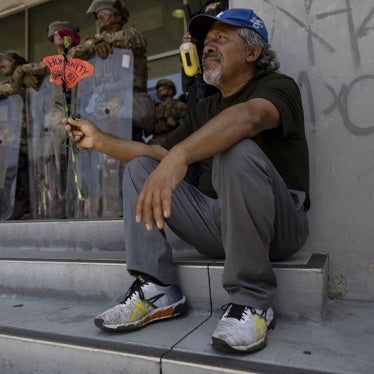Girls the world over confront an alarming array of threats to their safety, including physical and sexual violence in their schools, places of work, and in detention facilities, said Human Rights Watch today, in advance of International Women’s Day on March 8. Governments have largely failed to implement key measures preventing and responding to these abuses.
Human Rights Watch recently released three background papers summarizing research on violence against girls: “Violence against Schoolgirls;” “Violence against Child Domestic Workers;” and “Violence against Girls in Conflict with the Law.” These reports are based on Human Rights Watch investigations in 15 countries, including: Afghanistan; Brazil; the Democratic Republic of Congo; Egypt; El Salvador; Guatemala; Indonesia; Iraq; Malaysia; Morocco; Papua New Guinea; South Africa,; Togo; the United States; and Zambia.
“Girls are at risk of violence on the streets, in schools, at home, where they work, and in government institutions,” said Jo Becker, advocacy director for Human Rights Watch’s children’s rights division. “In far too many cases, girls are betrayed by the very individuals who are supposed to protect them – guardians, teachers, employers and the police.”
Schoolgirls may be raped, sexually assaulted, and sexually harassed by their classmates and even by their teachers. A medical research study found that among those South African rape victims who specified their relationship to the perpetrator, 37.7 percent said that a schoolteacher or principal had raped them. Students may also be targeted because of their sexual orientation or gender identity.
In situations of armed conflict, attacks against schools and teachers may keep girls out of school altogether. In Afghanistan, from January 2005 to June 2006, Human Rights Watch documented more than 200 incidents of teachers and students being killed or threatened, and schools being blown up or burned down. Such violence disproportionately affects girls, who are more likely than boys to be withdrawn from school.
Employers may subject child domestic workers to verbal and physical abuse, including severe beatings, burning with irons, and death threats. These children are often confined to their employer’s household, with little access to outside help. Child domestic workers are particularly vulnerable to sexual harassment and sexual violence from men and boys living in or associated with the household. More girls are employed in domestic work than any other form of child labor.
Girls in contact with justice systems are at risk of violence, particularly sexual abuse and rape, by police as well as staff in detention facilities. Police may target girls who live or work on the street for violence. Girls in detention may confront physical and sexual violence and humiliating treatment, particularly by male staff, and face violent or harmful disciplinary measures. Because of their smaller numbers, girls subject to detention are more likely than boys to be held in unsuitable and often dangerous conditions.
“In some areas, girls are making enormous strides, but violence stops many from enjoying their basic rights,” said Becker. “Governments need to back up words with action, and show that violence against girls won’t go unpunished.”
Human Rights Watch urged governments to take immediate steps to:
- Create confidential, fully staffed and toll-free hotlines to receive reports of abuses against girls, including mechanisms accessible to students, domestic workers, and children in detention;
- Ensure the prompt and effective investigation of such complaints, and prompt and appropriate action against perpetrators, including counseling, termination and criminal prosecution when warranted;
- Ensure that medical examinations, trauma counseling, emergency contraception, and post-exposure HIV prophylaxis are available to sexual assault survivors;
- In situations of insecurity, devise and implement a strategy to monitor, prevent, and respond to attacks on education, with special attention to the effects of attacks on girls’ education; and
- Ensure that children in conflict with the law are only detained as a last resort and for the shortest possible time. Prohibit the excessive use of force, and any disciplinary measures that may compromise the health of the child.
To read Human Rights Watch’s background papers on violence against girls, please visit:
https://www.hrw.org/english/docs/2007/02/20/global15357.htm








